Mohs surgery is a specialized technique for removing skin cancer with a high degree of precision while preserving as much healthy tissue as possible. This procedure is particularly effective for basal cell carcinoma, squamous cell carcinoma, and other skin cancers that occur in sensitive areas like the face, ears, and hands.
At The Institute for Advanced Reconstruction, our surgeons specialize in Mohs surgery, offering unparalleled precision in skin cancer treatment. Unlike traditional excision methods, Mohs surgery removes cancerous tissue in stages, allowing for real-time microscopic examination to ensure complete removal while preserving as much healthy skin as possible. By minimizing the removal of non-cancerous tissue, Mohs surgery not only improves cure rates but also reduces scarring and the need for extensive reconstruction. Our specialists are trained in both tumor removal and reconstructive techniques, ensuring that patients achieve the best possible functional and aesthetic outcomes.

Mohs Surgery

Understanding Mohs Surgery
What to Expect
Mohs surgery is performed as an outpatient procedure under local anesthesia, allowing patients to remain awake and comfortable throughout. The process involves removing thin layers of cancerous tissue one at a time, with each layer immediately examined under a microscope to check for remaining cancer cells. This step-by-step approach ensures that all cancer is removed while preserving as much healthy tissue as possible.
The duration of the procedure varies depending on the size and complexity of the tumor, but it typically takes several hours due to the meticulous nature of the tissue examination. Patients may be asked to wait between stages while the removed tissue is analyzed. Once the cancer is fully removed, the wound is either left to heal naturally, closed with stitches, or reconstructed using advanced techniques to optimize cosmetic and functional outcomes. Our surgeons prioritize both cancer eradication and aesthetic restoration, ensuring the best possible results for each patient.
After the Procedure
Recovery from Mohs surgery depends on the size and location of the excision, as well as whether reconstruction is needed. Most patients experience mild swelling, bruising, and discomfort for a few days, with noticeable improvement within a week. If stitches are used, they are typically removed within one to two weeks, while wounds left to heal naturally may take several weeks to months. Following postoperative wound care instructions—such as keeping the area clean, applying prescribed ointments, and protecting it from sun exposure—is essential for minimizing scarring and ensuring proper healing.
Most patients can return to normal activities within a few days, but strenuous exercise and heavy lifting may need to be avoided for up to two weeks to prevent strain on the surgical site. Your surgeon will provide specific recovery guidelines tailored to your procedure, including any necessary follow-up appointments.
Risks & Side Effects
- Temporary swelling and bruising
- Scarring (though minimized with reconstructive techniques)
- Infection (rare but possible)
- Bleeding at the surgical site
- Temporary or permanent numbness if nerves are affected
Am I a Candidate?
Mohs surgery is recommended for patients who require the highest level of precision in skin cancer removal while preserving as much healthy tissue as possible. Unlike traditional excision methods, which remove a predetermined margin of tissue around the tumor, Mohs surgery allows for real-time microscopic analysis, ensuring complete cancer removal while minimizing unnecessary tissue loss.
Mohs surgery may be recommended if you have:
- Basal cell carcinoma or squamous cell carcinoma
- Skin cancer in a cosmetically or functionally sensitive area (e.g., face, hands, scalp)
- A skin cancer lesion with unclear or aggressive margins
- Recurrent skin cancer that has not been fully removed by prior treatments
Our Surgeons
Patient Stories
Mohs Surgeons Near Me
Schedule an Appointment Today
Take the next step in your skin cancer treatment. Request an appointment with our Mohs surgery specialists today to discuss your options and receive expert care.



